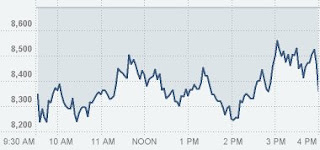
8,378.95
–312.30
–3.59%
Losses are still around 4%, but, if that continues to be cumulative it will be a far different scenario that avails itself next week. I really think all this government 'bailout' mess causes more problems in the market than it helps. If I were an investor and the governments of the world continued to throw money at failure, I would believe there was more coming that somehow my slide rule didn't pick up. I do not believe these bailouts are a good idea. Helping homeowners at the 'payment schedule' is the only bailout the USA needs.



